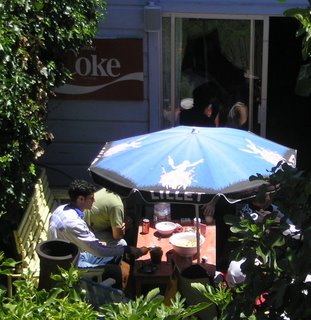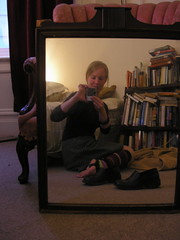Random notes from a lecture on the neuroeconomics of trust
Oh yes.
---------------------------
NEUROECONOMICS OF TRUST
Paul Zak
Who’s more trustworthy?
Children: women. Facial expressions. Eye contact, body language
Many cues doen’t exist in institutions where strangers interact
Civilizationa [gesellshaft] as non-face-to-face relationships
How did they evolve in kin-based groups?
To trust or not to trust as worldview
Madison: “There is a degree of depravity in mankind which requires a certain circumspection and distrust”
Blanche DuBois in Streetcar Named Desire: “I have always depended on the kindness of strangers.”
% per country who think others are trustworthy – 66% in Norway. 10% in Brazil, Columbia, Turkey, and Peru
happiness correlated with trust levels (direction of correlation later)
self-recorded depression negatively correlated with trust.
Environments in which trust cultivated
Trust reflects environments: Social, economic, political, legal environments
Low trust a powerful indicator of poverty
Investments (like legal contracts) have a drag on them when trust is low
Then growth can’t happen
Individuals decide to trust
Given a constant environment, how do individuals come to trust each other?
What happens in the brain when I decide to trust John?
Trusting strangers unique to human beings
Subjects in lab cannot articulate why they make trusting decisions
Calculative trust doesn’t appear in lab
Origins with mother?
Oxytocin in animals – hormone that makes fish want to approach other fishes
Very hard to measure, very labile, degrades quickly.
Areas of the brain associated with emotion accumulate oxytocin
All done out of conscious control
Kinda a gestalt
Try to get brain to make lots of the stuff
Vernon Smith’s lab – measuring trust
Requires individuals to make monetary sacrifice to trust stranger
Correlated with prayer, trust of president, trust of other people
Leave yourself open to exploitation because you expect some benefit
Hallmarks of schizophrenia is being withdrawn;
Receiving a trust signal causes oxytocin to rise
Trust begets trustworthiness
Oxytocin correlates with trustworthy behavior
Trait vs state – how to measure oxytocin processing as nature vs nurture
Violations of trust
Measure five exceptions who keep everything – 2% “bastards”
Brain dysfunction?
Social phobics?
Turn out to be emotionally labile, sexually very active
Oxytocin creates higher levels of bonding
Believe others are trustworthy
Rate themselves as very trustworthy
Nasal spray
People on exytocin don’t have fear of interacting with strangers
Dw1s Don’t expect to get things back
Dw2s don’t change – already trusting.
Just like fish
Massage therapist
Increases trust levels 300%
On/off switch?
HDT – circulates both in men and women, biologically inactive most of the time
Women are more distrusting, but more generous
The less you send a guy, the more dht. Men resent it.
Women don’t have a physiological response.
Current research – where in the brain
Women who are ovulating are less trustworthy. Progesterone stops trust.
Oxytocin produces dopamine so physically feels good.
Still a problem with social vs economic trust. – swiss Presbyterian farmers have a psychotic relationship with money but a high degree of trust.
Wilhelm Reich crackpot psychologist says that armored and unarmored man perceive and react to the world differently, hold their bodies. Differently. You seem to have provided the physiological proof of this theory. The extension of his thought is the theory of an “emotional plague” which transfers from person to person. Can only be prevented by careful selection of educators and media figures. What do you think?
[
test: attention and trust. More trust more attention. Ragmenting attention by lack of trust.
Problem: same conclusions already reached by philosophers and psychologists without need for blood test. So having a odel for why – based on hormones – tells nothing. Merely provides an easy answer to the why question (it’s always evolution) and the solution question (more drugs)
These people are dangerous.






 It could be that existentialism gets rid of the identity problem. What matters isn't so much answering the question as committing to a course of action — you are what you do.
It could be that existentialism gets rid of the identity problem. What matters isn't so much answering the question as committing to a course of action — you are what you do. He rescues her from the farm where she is doped in drugs and being sold as a piece of flesh among the cattle.
He rescues her from the farm where she is doped in drugs and being sold as a piece of flesh among the cattle.










